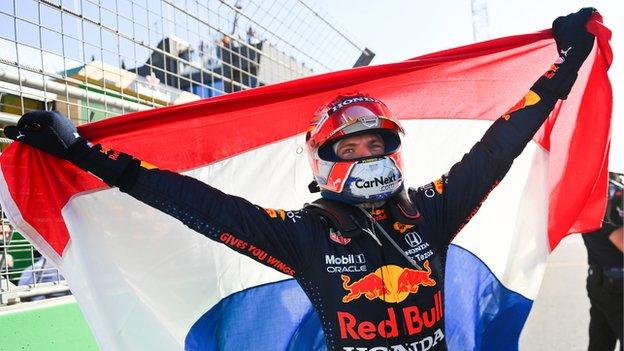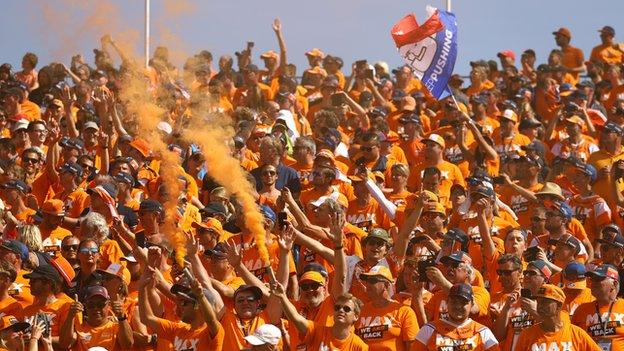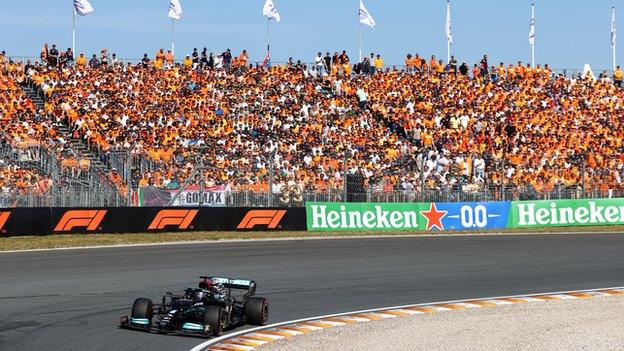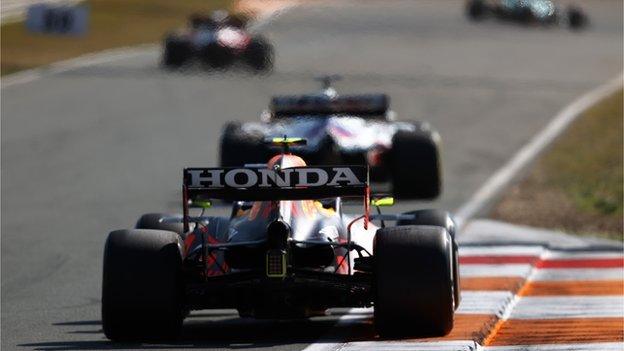Max Verstappen's Dutch GP win: 'I have never seen a nation get behind a driver in this manner'
- Published

Victory at Zandvoort in front of 65,000 fans was Verstappen's seventh win in 13 races
"If you can keep your head when all about you are losing theirs," Rudyard Kipling wrote long ago in one of his most famous poems, "yours is the Earth and everything that's in it."
The Dutch Grand Prix was effectively a four-day beach party, with Max Verstappen at its centre. Yet while his adoring fans danced and chanted, cheered and let off their flares, accompanied by a constant dance-music backdrop, the Red Bull driver was the calm at the eye of the orange storm.
A nation was willing Verstappen on to victory at Zandvoort. Even the king of the Netherlands turned up to watch. But if there was pressure on Verstappen, you would not have known.
The 23-year-old was flawless and imperious all weekend, and on Sunday afternoon he delivered the dominant win the 65,000 fans packed into the little resort town on the North Sea had come to see.
"Max was remarkable this weekend," Red Bull team principal Christian Horner said. "If you drive through the town to the circuit, every house has got Verstappen flags. There is so much support for him, and I have never seen a nation get behind a driver in this manner.
"From the moment we've arrived, the music has been going, the build-up, the intensity and the one person who hasn't felt it has been Max.
"He was focused on his own job, gone about his business in the same way as at other races and he almost seemed oblivious to what was happening on the other side of the fence, with the mayhem and partying that was ensuing. The noise on the grid - I've never heard anything like it."
In the maelstrom, Verstappen was calmness personified. Was it difficult to stay focused, he was asked?
"I have been always very focused," he said. "I know I have to focus on the driving. That has been quite straightforward. There are more distractions on the grid, or when you drive out and there is more of a crowd, but we are professional enough to just focus on our job once we are in the car."
Lewis Hamilton did his best to disrupt the Verstappen benefit, but ultimately he and his Mercedes did not have the pace. And, by three points, Verstappen reclaimed the championship lead he last held after the British Grand Prix in mid-July.

The orange army were gifted the ultimate prize as Verstappen took victory
No answer to 'the rocket'
Mercedes F1 boss Toto Wolff did his best to talk up his team's performance after the race.
Wolff argued that Verstappen had claimed pole position by "a tiny bit", and pointed out that Hamilton's weekend had been disrupted by missing almost all of the second practice session with an engine problem. Without that, Wolff said, they could perhaps have taken pole and "that would have changed the outcome of the race".
In truth, though, Verstappen and Red Bull were just that bit too fast in Zandvoort, and Hamilton admitted it.
"Today needed everything perfect to even have the slightest chance," Hamilton said. "Pit stops, strategy and traffic needed to be on point, but none of those three were ideal. But we got second and third and got really good points in the constructors' championship and we will come back fighting next week."
It was not too hard to find the evidence for Verstappen's superiority. He was quick from the off in the first practice session. He never got a clean lap in the second, because of two red flags, but his long-run pace was comfortably superior to that of Hamilton's team-mate Valtteri Bottas.
In final practice on Saturday morning, Verstappen was more than 0.5 seconds clear of the Mercedes. And while he took pole by only 0.038secs from Hamilton, that belied his true advantage.
Verstappen had lost 0.15secs with an inadvertent double gear change over the bumps at the exit of Turn Three, and then about that again when his DRS overtaking aid did not open on the run to the line. He should have been on pole by 0.3secs or so around one of the shortest laps on the calendar.
Having won the start, Verstappen was 1.7secs clear after the first lap. "He was a rocket off the start," Hamilton said. "He was gone. Nothing we could do to answer that." Measuring his tyre life, Verstappen was still three seconds up after seven laps.
Mercedes tried the lot. An undercut attempt with an early first pit stop by Hamilton was a long shot and they knew it, but foundered anyway with a slowish tyre change after the seven-time champion stopped slightly past his marks.
Mercedes left Bottas out in the hope he could hold Verstappen up and give Hamilton a chance to pass, but the Red Bull was past as soon as he caught the Finn, so little grip did Bottas' tyres have by then.
Hamilton was quicker in the second stint than the first, and had the gap under two seconds for a while. But it was too early for a second stop at that point, the tyres would not have got to the end, and by the time Mercedes did pull the trigger, Verstappen's lead was close to three seconds again. So when Hamilton stopped, Verstappen followed him in on the next lap and retained his position.
Verstappen had, as Horner put it, "a tenth in hand, maybe two, that Max was able to use when he needed to build up a three-second gap".

Hamilton had no answer for the home hero's tremendous pace
'The quickest I think they have been all year'
Looking beyond this one race, there is a concerning trend for Mercedes. This was Verstappen's seventh win in 13 races, from his seventh pole, and his sixth pole in the past seven qualifying sessions. Hamilton has not won a race on genuine pace since the Spanish Grand Prix in early May.
Mercedes did bounce back with an upgrade at the British Grand Prix after Red Bull had won five races on the trot. But there was no direct comparison there because Verstappen, who had won the new 'sprint qualifying' race on Saturday, was in the wall on lap one of the main race after his controversial crash with Hamilton.
Mercedes clearly had a pace advantage in qualifying at the next race in Hungary. The chaotic race there, and Verstappen's blameless involvement in the first-lap pile-up, ensured Hamilton could regain the championship lead.
But the momentum appeared to swing again in Belgium after the summer break, although it was hard to get a clear picture because of the rain that led to the race being aborted. And there is little doubt the Red Bull was the faster car at Zandvoort.
"They were so fast today," Hamilton said. "That's the quickest I think they have been all year.
"There is a long way to go. They put an upgrade on their car at the last race and today you have seen the improvement they have made, so we have to do some work. We've got to bring something to be able to compete with them."
Both Wolff and Horner believe the advantage will swing over the rest of the season depending on each individual track and how it plays to the strengths of each particular car.
"There will be circuits that suit Mercedes and suit us over the next phase of the championship," Horner said. "We just need to make sure we grab every opportunity. We did that today under massive pressure."

Perez was on the chase as he recovered to eighth
'Look at the pace, not the result'
Next week is the Italian Grand Prix at Monza, which on paper gives Hamilton and Mercedes a chance to hit back.
Red Bull have traditionally struggled at the so-called 'temple of speed' in recent years. With their particular car-design philosophy, they do not find the same efficiency Mercedes do when they take downforce off their car. But that was then. Will it be the same now? There have not been many tracks at which Red Bull have struggled this year.
Hamilton said: "We will be on lower downforce and we can maybe be closer there, but it is going to be tough.
"These guys have had such a strong car all year. We're trying as hard as we can. We had a couple of races where it looked like we were on par or slightly ahead but only a couple and then it took a big leap.
"There is nothing more I can say. We just have to keep our heads down and keep working. We are ahead in the teams' championship, which is great, but we need to pick up some speed if we want to be able to win races in future."
Verstappen put the other side of the argument: "They did pole in Silverstone even though it didn't count as a pole. And they were ahead in Hungary where they definitely had more pace than us. But Hungary was a crazy race. So you shouldn't look at statistics. Look at the realistic pace and not always the result.
"They would have won Hungary if it went normal. In the [summer] break, I thought we really need to speed things up or they will run away with it. We did pick it up a bit. I feel like we still need a bit more but it is heading in the right direction."
